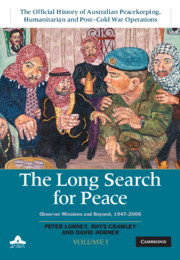Book contents
- The Long Search for Peace
- The Official History of Australian Peacekeeping, Humanitarian and Post–Cold War Operations
- The Long Search for Peace
- Copyright page
- Contents
- Maps
- Preface
- Glossary
- Part 1 Actor and observer
- Part 2 New ambitions
- 16 The new internationalists
- 17 A ‘lop-sided’ umpire
- 18 Snow Goose and the Milk Run
- 19 An island divided
- 20 Desert sortie
- 21 On the Golan
- 22 Witnesses to civil war
- 23 Fumbling the political football
- 24 The tribe that lost its head
- 25 Into Africa
- 26 A dangerous but crucial mission
- 27 The healing touch
- 28 ‘The only show in town’
- Part 3 Carrying on
- Conclusion
- Book part
- Bibliography
- Index
- Plate Section (PDF Only)
22 - Witnesses to civil war
Australian military observers in Lebanon, 1972–89
from Part 2 - New ambitions
Published online by Cambridge University Press: 27 September 2019
- The Long Search for Peace
- The Official History of Australian Peacekeeping, Humanitarian and Post–Cold War Operations
- The Long Search for Peace
- Copyright page
- Contents
- Maps
- Preface
- Glossary
- Part 1 Actor and observer
- Part 2 New ambitions
- 16 The new internationalists
- 17 A ‘lop-sided’ umpire
- 18 Snow Goose and the Milk Run
- 19 An island divided
- 20 Desert sortie
- 21 On the Golan
- 22 Witnesses to civil war
- 23 Fumbling the political football
- 24 The tribe that lost its head
- 25 Into Africa
- 26 A dangerous but crucial mission
- 27 The healing touch
- 28 ‘The only show in town’
- Part 3 Carrying on
- Conclusion
- Book part
- Bibliography
- Index
- Plate Section (PDF Only)
Summary
The first 30 years of conflict between the State of Israel and its Arab neighbours was focused chiefly on Egypt, Jordan and Syria. But Egypt made peace with Israel in 1978 and Jordan in 1994, after a long period of de facto peace between the two countries; and although there has been no peace between Israel and Syria, and Israel still occupies a large part of the Syrian Golan, the area itself was generally quiet from 1974 to 2006 (when this history ends) and beyond. Instead, after the 1973 War, there was increased conflict between Israel and the Palestinians in the occupied territories of Gaza and the West Bank, and vastly escalated conflict between Israel and its northern neighbour Lebanon. These conflicts were not unconnected, but this chapter looks in particular at the case of Lebanon.
- Type
- Chapter
- Information
- The Long Search for PeaceObserver Missions and Beyond, 1947–2006, pp. 551 - 577Publisher: Cambridge University PressPrint publication year: 2019

